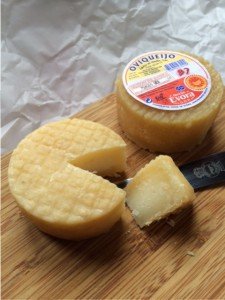This a monthly series which I have been publishing for years. You can subscribe here, to get the latest cheese delivered directly on to your screen.
The wild and wide Alentejo in southern central Portugal is exactly what you need when November finally settles on our shores with its chilly darkness, and shelves begin to be invaded way too soon and aggressively by gingerbread and chocolate Santas. The small sheep cheeses from Évora evoke the light and the aromas of the austere, sun drenched garrigue pastures roamed by the shepherds and their animals.
 His parents used to follow them as cheese makers, like gipsies, Fernando Pereira (50) told me. He helped them from his earliest years on, but since long has settled down with his own Fabrico de Queijos in Borba. I’m fascinated by these round cheeses because – if they are truly made in a traditional way using local milk – they really tell the story of that sun lit, rather empty landscape. That is due to more than just the aromatic richness and goodness of the sheeps milk though: for the Évora it is curdled (like for quite a few other traditional Portuguese cheeses) using not animal rennet but an extract made from local thistles containing the same enzyme.
His parents used to follow them as cheese makers, like gipsies, Fernando Pereira (50) told me. He helped them from his earliest years on, but since long has settled down with his own Fabrico de Queijos in Borba. I’m fascinated by these round cheeses because – if they are truly made in a traditional way using local milk – they really tell the story of that sun lit, rather empty landscape. That is due to more than just the aromatic richness and goodness of the sheeps milk though: for the Évora it is curdled (like for quite a few other traditional Portuguese cheeses) using not animal rennet but an extract made from local thistles containing the same enzyme.
I wrote about this recently in Effilee. In general the thistle stuff makes for more and faster „action“ in the vat, so that cows milk can easily develop an unpleasant bitterness. Sheeps milk, however, offers so much richness for the thistles to work on that everything in the vat is dancing along happily (as well as the cheese maker watching it), making for a glorious lemon-yellow acidity in the mature cheeses. The small things – just under 6cm wide and not even 3cm high – can develop for an amazingly long time. After several months they might look hard and dry, but under their shiny disguise they crumble like the best shortbread and are very much alive.
 Traditionally two sizes of cheese are made in Évora, one slightly larger and consumed fresh as workers‘ sustenance and the small ones to keep for the winter when the sheep are pregnant and are not milked. Unfortunately Fernando’s cheese isn’t available in Germany, but finally, thanks to Manuel Maia and his company Tradifoods as well as the enthusiasm Maître Philippe shows for everything tasty and good from Portugal, we can brighten up our winter months with these equally delicious, lovely little things from the Cooperativa Ovina from Évora. So when the bells jingle a little bit too loud and the wind seems a tat too cold, let a sun drenched little yellow fellow warm your heart – and treat both of you to a glass or two of Alicante Bouschet from Esporão. Happy November!
Traditionally two sizes of cheese are made in Évora, one slightly larger and consumed fresh as workers‘ sustenance and the small ones to keep for the winter when the sheep are pregnant and are not milked. Unfortunately Fernando’s cheese isn’t available in Germany, but finally, thanks to Manuel Maia and his company Tradifoods as well as the enthusiasm Maître Philippe shows for everything tasty and good from Portugal, we can brighten up our winter months with these equally delicious, lovely little things from the Cooperativa Ovina from Évora. So when the bells jingle a little bit too loud and the wind seems a tat too cold, let a sun drenched little yellow fellow warm your heart – and treat both of you to a glass or two of Alicante Bouschet from Esporão. Happy November!
This a monthly series which I have been publishing for years. You can subscribe here, to get the latest cheese delivered directly on to your screen.
If you enjoyed reading this, you might consider clicking on the button below and supporting me in my work. I’d be more than happy. Thank you.
